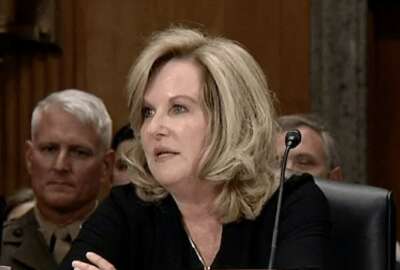

Leadership on two House committees are skeptical of a proposed rule from the EEOC, which would reverse a 40-year-old policy allowing union representatives official...
Two House committee leaders said they’re skeptical of the Equal Employment Opportunity Commission’s plans to reverse a 40-year-old federal rule allowing union representatives official time to prepare discrimination complaints on behalf of their coworkers.
EEOC detailed those plans in a proposed rule back in December, which earned harsh criticism from federal employee unions.
“We are extremely concerned about the potential effects of this proposed rule on the enforcement of employment anti-discrimination laws and policies affecting federal employees and the fairness of the federal workforce,” House Oversight and Reform Committee Chairman Carolyn Maloney (D-N.Y.) and Education and Labor Committee Chairman Bobby Scott (D-Va.) wrote Thursday in a letter to EEOC Chairwoman Janet Dhillon.
Currently, union representatives are granted official time during work hours to prepare equal employment opportunity complaints on behalf of their coworkers in the bargaining unit. Federal employee unions have often said allowing representatives the time to prepare EEO complaints ultimately benefits the agency in the long run, because the practice gives employees the time and space to make sure their concerns are heard in the workplace.


They want to know, for example, how the proposed policy might impact the backlog of EEO cases awaiting adjudication at the commission and whether the rule is intended to exclude union representatives from receiving official to work on EEO complaints even if those individuals aren’t eligible for official time under their collective bargaining agreements.
In addition, Maloney and Scott have asked EEOC to explain “how the proposed rule would affect financial cost to complainants, including the average financial cost to complainants, if the rule led complainants to retain attorneys to represent them in matters for which they would otherwise have enlisted a union representative on official time.”
They’ve also asked for all communications about EEOC’s proposed official time rule from former EEOC Chairwoman Victoria Lipnic, Dhillon and Andrew Maunz, a special assistant to the current commission chairwoman.
Maunz was tapped by the president last year to serve on the Merit Systems Protection Board but withdrew his name from the nomination amid vocal criticism from employee unions.
In its proposed rule, EEOC has argued the current official time practices are the product of past EEO investigation, hearing and appeal procedures and not reflective of the current Federal Service Labor-Management Statute.
The EEOC inherited federal sector EEO complaint processing procedures from the Civil Service Commission back in 1979. Though the commission has revised them several times, EEOC has argued the current official time procedures for employee union representatives are unclear and need more clarity.
The commission’s plans to amend current official time policies come as agencies and unions continue to grapple with the impacts of the president’s 2018 workforce executive orders, which are charting new ground in some respects when it comes to employee removals, collective bargaining and official time.
Several employee unions have said they’re feeling the effects of those EOs, which have set strict limits on the amount of official time union representatives can use in a given year.
A group of five Democrats on the Senate Health, Education, Labor and Pensions Committee have also expressed their concerns with the commission’s proposed official time policy changes.
“Constraining the EEO process for all federal employees by limiting their choice of representation undermines the EEOC’s mission to enforce federal anti-discrimination laws and combat harassment in the workplace,” committee Ranking Member Patty Murray (D-Wash.) wrote in a Jan. 21 letter to Dhillon. “The agency’s rationale for changing its longstanding policy is unfounded and represents yet another attack by the Trump administration on career civil servants and the unions that represent them. We urge you to abandon this unsubstantiated, unnecessary and harmful proposed rule.”
Sens. Bernie Sanders (I-Vt.), Tim Kaine (D-Va.), Elizabeth Warren (D-Mass.) and Tammy Baldwin (D-Wis.) joined Murray in expressing their opposition.
The public comment period on EEOC’s proposed rule will close Feb. 10.
Copyright © 2025 Federal News Network. All rights reserved. This website is not intended for users located within the European Economic Area.
Nicole Ogrysko is a reporter for Federal News Network focusing on the federal workforce and federal pay and benefits.
Follow @nogryskoWFED
